In recent times, we’ve seen a resurgence of imperialistic ambitions, particularly from figures like Donald J. Trump. His proposals to acquire territories such as Greenland, Canada, and even the Gaza Strip have sparked intense debates about a new form of imperialism—postmodern imperialism—one that no longer relies solely on military force but instead leverages economic sanctions, tariffs, and cultural influence to expand power.
But what does this mean for the global economy? How does pursuing territorial expansion in a modern era reshape international trade, diplomacy, and economic stability? How can world leaders ensure fair play and prevent a single superpower from dominating global supply chains?
In this blog, I’ll break down the mechanics of postmodern imperialism, its economic impact, and the strategies that nations must adopt to maintain a balanced global order.
Imperialism
Imperialism is the policy of expanding a nation’s power and influence, often through colonization, military force, or economic control. It has been a defining strategy of powerful civilizations throughout history, from the Greeks and Romans to the British and Ottoman Empires.
At its core, imperialism operates on the belief that expansion equals strength. The more land, resources, and trade routes a nation controls, the more powerful it becomes. This philosophy drove empires to conquer, annex, and dominate weaker regions, reshaping the world map for centuries.
Imperialism can take many forms:
- Military Imperialism – Using force to seize and maintain control over territories (e.g., the Roman Empire).
- Economic Imperialism – Controlling another nation through trade, sanctions, and resource dependency (e.g., British control over India’s economy).
- Cultural Imperialism – Spreading ideology, language, and cultural norms to dominate other societies (e.g., the spread of Western influence in the 20th century).
While imperialism has been a key force in shaping global history, it has also led to conflict, resistance, and economic instability, which ultimately caused many imperial powers to collapse.
Why Imperialism Did Not Work
History has shown that while imperialism can lead to rapid expansion and short-term power, it ultimately fails due to its inherent instability. The larger an empire grows, the more difficult it becomes to sustain, and several key factors contribute to its downfall:
1. If A Fights B, C Wins
Imperialism breeds constant warfare. When two major powers engage in a struggle for dominance, a third party—a rising competitor or a rebellious faction—often takes advantage of their weakened state.
For example, in historical wars, the fall of one empire often created opportunities for others to rise. The power vacuum left behind by exhausted imperial forces allowed new challengers to emerge, leading to cycles of endless conflict rather than long-term stability.
2. The Country is Always at War
Expansionist policies mean a nation is always engaged in battles, conquests, or suppressing rebellions. This has three major consequences:
- Bad for the Economy – War drains resources, diverts funds from infrastructure and development, and disrupts trade. Even if an empire seizes wealth from conquered lands, maintaining control is expensive.
- Bad for Society’s Mental Health – A population constantly at war lives in fear, uncertainty, and nationalistic propaganda. This leads to long-term psychological stress.
- Bad for Physical Health – Wars result in high casualties, leaving behind wounded soldiers and broken societies. A nation filled with crippled veterans and lost generations struggles to sustain itself.
3. Fewer Allies, More Enemies
Imperial powers are rarely trusted. When a country expands aggressively, others fear they will be next. This leads to:
- Betrayed Alliances – Treaties become meaningless when imperialist nations break agreements (e.g., Germany’s invasion of Poland despite prior assurances).
- Increased Resistance – Conquered regions often resist occupation, leading to revolts, insurgencies, and civil unrest.
- Global Isolation – Imperialist nations eventually find themselves surrounded by hostile neighbors, making diplomacy nearly impossible.
The Inevitable Collapse
Imperialism creates more enemies than allies, spreads resources too thin, and keeps a country in a perpetual state of war. As history has shown, this is not sustainable. The Roman Empire, the Mongols, and even colonial European powers eventually fell because the cost of maintaining an empire outweighed the benefits.
Yet, despite these failures, the desire for territorial expansion still exists today—just in different forms.
In the next section, we’ll explore how modern leaders have adapted imperialist strategies to fit today’s world.
Postmodern Imperialism: The Rebranding of Expansionism
Traditional imperialism, with its outright military conquests and colonization, collapsed under its own weight. But that doesn’t mean the ambition to dominate has disappeared. Instead, it has evolved—imperialism is no longer about sending armies; it’s about controlling economies, shaping cultures, and influencing governments without direct warfare.
This new-age expansionism is what we call Postmodern Imperialism.
What is Postmodern Imperialism?
Postmodern imperialism is the modern rebranding of imperialist strategies, replacing military invasions with economic, political, and cultural influence to achieve control over other nations. Instead of sending troops to seize territory, a superpower can:
- Use economic sanctions to cripple another country’s economy.
- Control supply chains to make nations dependent on their resources.
- Impose tariffs and trade restrictions to weaken foreign competitors.
- Push cultural propaganda to influence public perception and shape political ideologies.
The goal is the same as classical imperialism—expanding influence and dominance—but the methods have become more subtle and strategic.
How Postmodern Imperialism Works in Today’s World
1. Economic Sanctions as a Weapon
Instead of military occupation, modern superpowers use economic sanctions to cripple nations that do not comply with their interests. By restricting access to trade, financial systems, and critical supplies, a powerful country can bend another nation to its will without firing a single shot.
- Example: The U.S. has imposed sanctions on countries like Iran and Russia, crippling their economies and forcing them to negotiate on American terms.
2. Controlling Global Supply Chains
Owning critical industries—such as oil, semiconductors, and food production—allows a country to dictate terms to others. If a nation relies on a superpower for essential resources, they are economically enslaved without realizing it.
- Example: The U.S. and its allies control key semiconductor technologies, making it difficult for China to advance its chip industry independently.
3. Trade Tariffs & Economic Pressure
Tariffs and trade restrictions are modern tools of economic warfare. By manipulating trade agreements, powerful nations can weaken their competitors and force smaller economies into submission.
- Example: The U.S.-China trade war involved heavy tariffs on Chinese goods, increasing costs for China and making them more dependent on negotiations with the U.S.
4. Cultural Imperialism & Propaganda
Rather than imposing direct rule, postmodern imperialists use media, entertainment, and technology to shape public perception and political ideologies. This method allows them to control how people think, vote, and behave in a way that benefits their long-term interests.
- Example: Hollywood and Western media portray the U.S. as the global standard for democracy and freedom, influencing political ideologies worldwide.
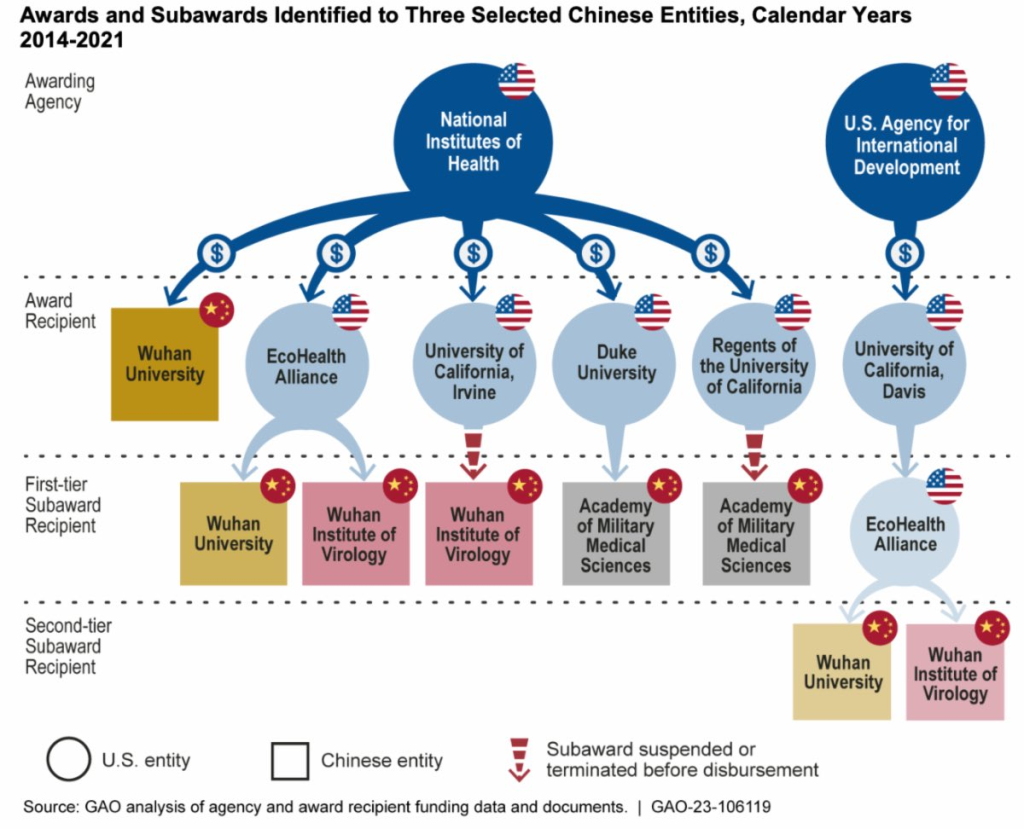
The Ben-Gurion Canal: A Strategic Power Move
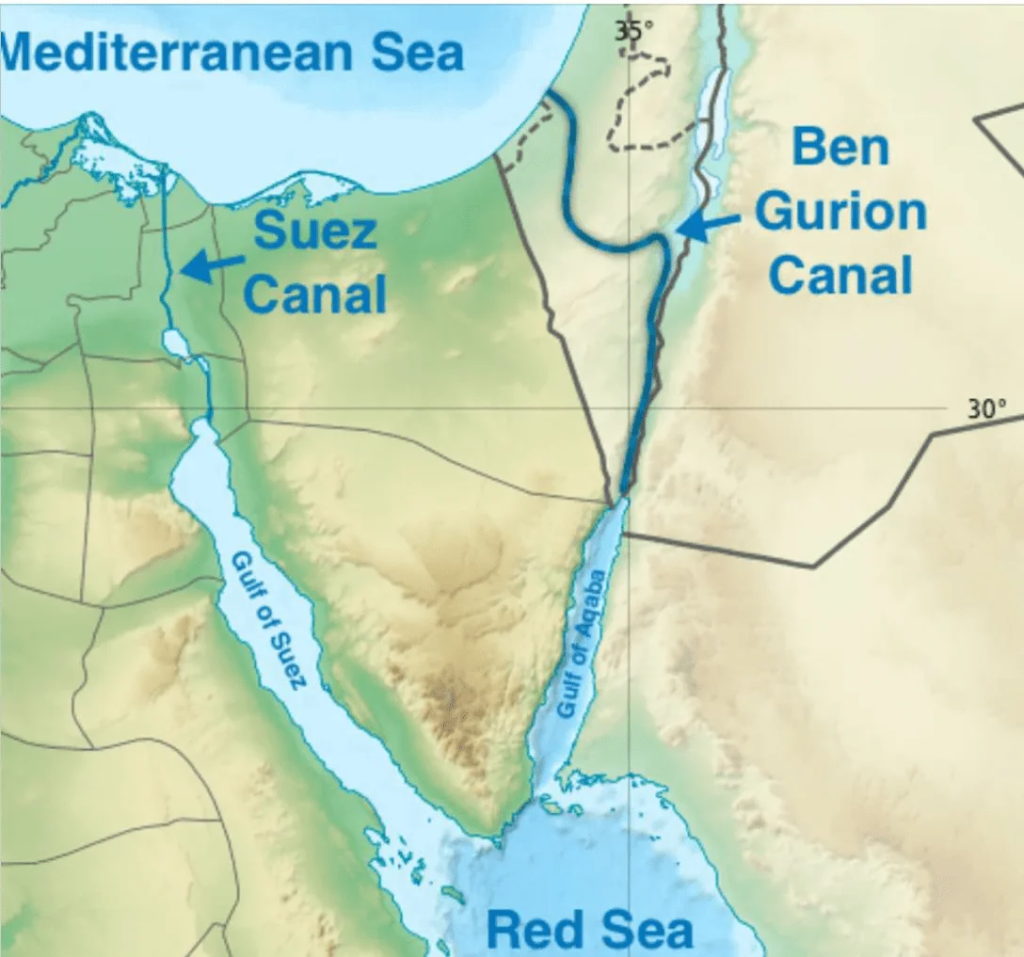
One of the most under-discussed yet crucial aspects of modern geopolitics is the Ben-Gurion Canal—a proposed waterway that could rival the Suez Canal, significantly altering global trade routes. Trump’s interest in Gaza isn’t just about territory; it’s about controlling a key chokepoint that could reshape the balance of economic power.
But what exactly is the Ben-Gurion Canal, and why is it so important?
What is the Ben-Gurion Canal?
The Ben-Gurion Canal is a proposed alternative to the Suez Canal, cutting through Israel and connecting the Mediterranean Sea to the Red Sea. If constructed, this canal would:
- Provide a shorter and potentially cheaper route for global shipping.
- Give the U.S. and Israel a strategic alternative to Egypt’s Suez Canal.
- Shift economic power away from Egypt and its allies, putting control in the hands of the West.
Why the U.S. Wants to Control the Ben-Gurion Canal
Trump’s alleged plans to acquire Gaza can be linked to a much broader economic and strategic vision. By controlling Gaza, the U.S. and its allies could potentially:
1. Reduce Dependence on the Suez Canal
The Suez Canal currently handles 12% of global trade, making it one of the most vital waterways in the world. Egypt profits immensely from this, earning billions in revenue from transit fees. A Ben-Gurion Canal would provide an alternative route, breaking Egypt’s monopoly and shifting economic leverage to U.S.-backed interests.
2. Strengthen U.S. and Israeli Geopolitical Influence
Whoever controls a major trade chokepoint controls the global economy. The U.S. has already demonstrated this strategy by controlling trade routes in the Panama Canal, and the same could happen with the Ben-Gurion Canal. If the U.S. or its allies own the passage, they can:
- Charge transit fees, redirecting wealth and power.
- Dictate who gets access, using it as a bargaining tool in international diplomacy.
- Weaken adversaries like China and Russia, who rely on these trade routes.
3. Create a Direct Shipping Route for Oil and Goods
This is particularly crucial given Trump’s pro-oil stance, as controlling energy transport routes solidifies dominance over global markets.
A Ben-Gurion Canal would allow for faster and more cost-efficient transportation of oil from the Middle East to Europe and the U.S.
The Panama Canal: A Silent Lever of Global Power
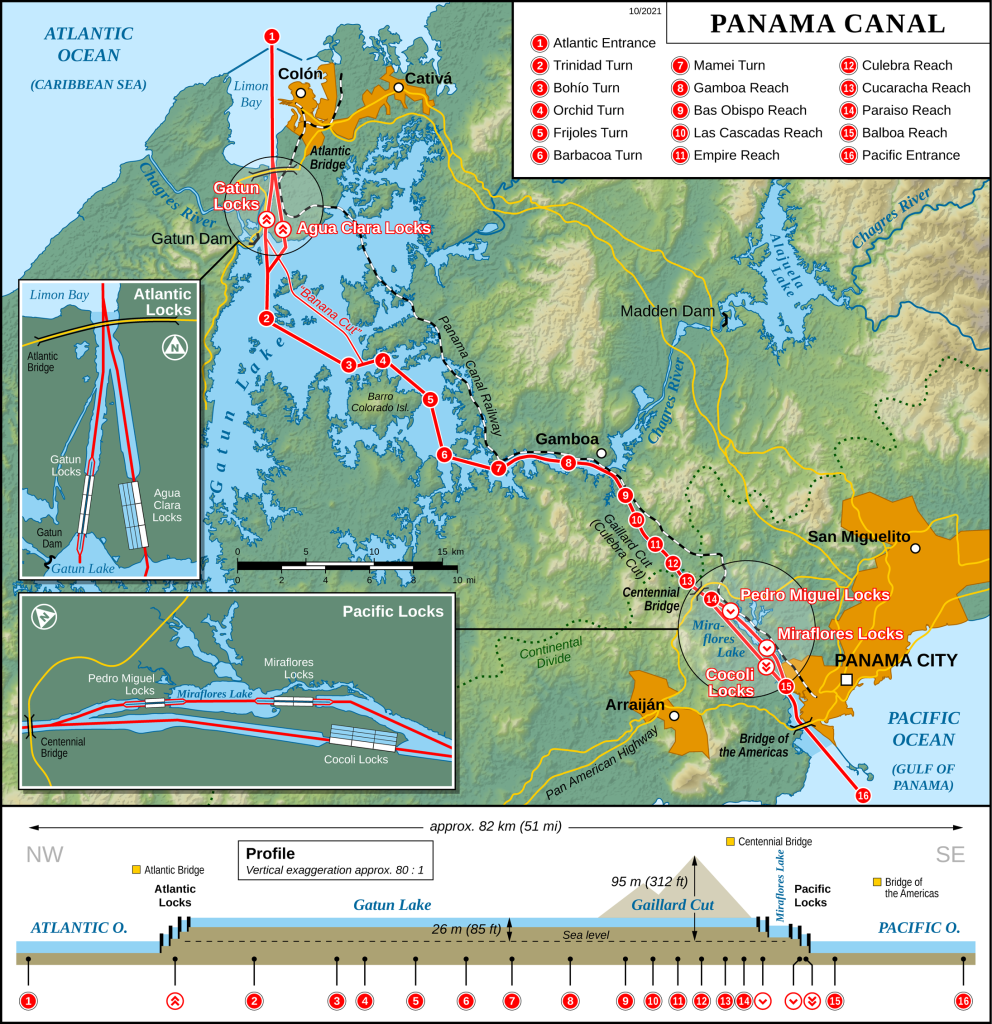
The Panama Canal is one of the most strategically important waterways in the world. It connects the Atlantic and Pacific Oceans, significantly reducing the time and cost of global shipping. Controlling this chokepoint means controlling a major artery of international trade, and Trump—like many U.S. leaders before him—understands its value.
Historically, the U.S. built and controlled the canal until 1999, when it was handed over to Panama under the Torrijos-Carter Treaty. Since then, China has made significant economic inroads in Panama, raising concerns in Washington. Trump’s interest in the Panama Canal is not about military occupation, but about reasserting U.S. dominance over global trade.
Strategic Reasons for Controlling the Panama Canal
1. Countering China’s Influence in the Region
- Over the past two decades, China has invested heavily in Panama’s infrastructure, ports, and trade relations.
- Chinese companies operate key shipping terminals near the canal, which gives Beijing leverage over one of the world’s busiest trade routes.
- Trump, whose administration was focused on containing China’s economic expansion, viewed reasserting U.S. control over the Panama Canal as a necessary move to counter Chinese dominance.
2. Controlling Global Supply Chains
- The canal is a critical transit point for goods moving between Asia, North America, and Europe.
- If the U.S. controls this route, it can prioritize American trade interests while imposing restrictions or higher fees on rival nations.
- This move aligns with Trump’s America First policy, ensuring that U.S. businesses benefit first from the canal’s operation.
3. Securing U.S. Military and Economic Interests
- The Panama Canal is not just about trade; it’s also a geopolitical asset.
- If a conflict arises, controlling the canal ensures that U.S. naval forces and commercial shipments move freely while restricting adversaries.
- By strengthening its presence in Panama, the U.S. can fortify its influence over Latin America, a region where China and Russia have been expanding their reach.
Why Trump Wants Canada and Greenland
One of Trump’s most overlooked but strategically crucial ambitions was securing control over the world’s oil production and supply chains. His interest in Canada and Greenland is not just about land or political influence—it’s about energy dominance.
Why Oil Control Matters
Oil is the lifeblood of the global economy. Every major industry—from transportation and manufacturing to technology and defense—depends on a steady, reliable flow of oil. Whoever controls oil production and its supply chains controls global trade.
Trump, a strong advocate for fossil fuel industries, understood that to “Make America Great Again,” the U.S. needed energy independence and supply chain dominance. By securing Canada’s oil reserves and Greenland’s untapped resources, Trump could have positioned the U.S. as the undisputed leader in global energy markets.
Why Canada? The Oil Powerhouse
Canada is home to some of the largest oil reserves in the world—ranked fourth globally, behind Venezuela, Saudi Arabia, and Iran. The majority of this oil comes from the Alberta oil sands, which are rich in crude oil but require advanced refining processes.
Trump’s interest in Canada was fueled by three key reasons:
1. Dominating North America’s Energy Market
- Canada exports nearly 90% of its oil to the U.S., making it America’s largest and most reliable energy supplier.
- By securing greater control over Canada’s oil industry—either through economic deals or political pressure—Trump could monopolize the North American oil market, reducing reliance on Middle Eastern oil.
- This would also give the U.S. leverage over Europe and Asia, since many nations depend on Canadian oil.
2. Weakening OPEC and Russia’s Influence
- The Organization of the Petroleum Exporting Countries (OPEC) and Russia control much of the global oil supply, allowing them to manipulate prices to their advantage.
- If the U.S. fully controlled Canadian oil, it could flood the market with supply, undercutting OPEC and Russia’s ability to dictate prices.
- This would make American allies less dependent on oil from adversarial nations.
3. The Keystone XL Pipeline & Tariffs as Leverage
- Trump’s push for the Keystone XL Pipeline was an attempt to increase U.S. access to Canadian crude oil.
- His administration also threatened trade tariffs on Canadian oil exports, forcing Canada into economic negotiations that would favor the U.S.
- The ultimate goal was to make Canada’s oil production an extension of the U.S. supply chain.
Why Greenland? The Untapped Resource Giant
Greenland, an autonomous territory under Denmark, may not be a major oil producer yet—but it holds massive untapped oil and mineral reserves beneath its Arctic ice.
Trump’s attempt to “buy” Greenland in 2019 may have sounded bizarre, but it was a calculated move. Greenland offers two major advantages in the race for energy and resource dominance:
1. Access to Arctic Oil & Gas Reserves
- As climate change melts Arctic ice, new oil and gas reserves are becoming accessible.
- Greenland’s coastline is believed to contain over 50 billion barrels of untapped oil, which could rival the reserves of major OPEC nations.
- If the U.S. controlled Greenland, it could prevent China and Russia from exploiting Arctic resources, ensuring U.S. dominance in future energy production.
2. Strategic Military & Shipping Control
- Greenland sits at a geopolitical crossroads, offering access to both the Atlantic and Arctic trade routes.
- Controlling Greenland would allow the U.S. to secure shipping lanes for oil transport, ensuring that no rival power could block or disrupt oil supply chains.
- It would also expand U.S. military reach in the Arctic, further asserting dominance over global energy security.
Suggestions for World Leaders: The India-China-Russia Economic Corridor
The modern world economy is shaped by supply chain dominance, resource control, and strategic trade routes. The United States, through postmodern imperialism, has positioned itself as the key player in many of these sectors, influencing global markets through trade policies, economic sanctions, and energy control. However, such dominance creates vulnerabilities for nations dependent on American-controlled supply chains.
To ensure a balanced global economy, an India-China-Russia Economic Corridor (ICREC) presents itself as a viable alternative. This corridor would integrate Russia’s vast natural resources, China’s industrial and technological capabilities, and India’s growing workforce and economic potential into a single trade system that rivals U.S. influence.
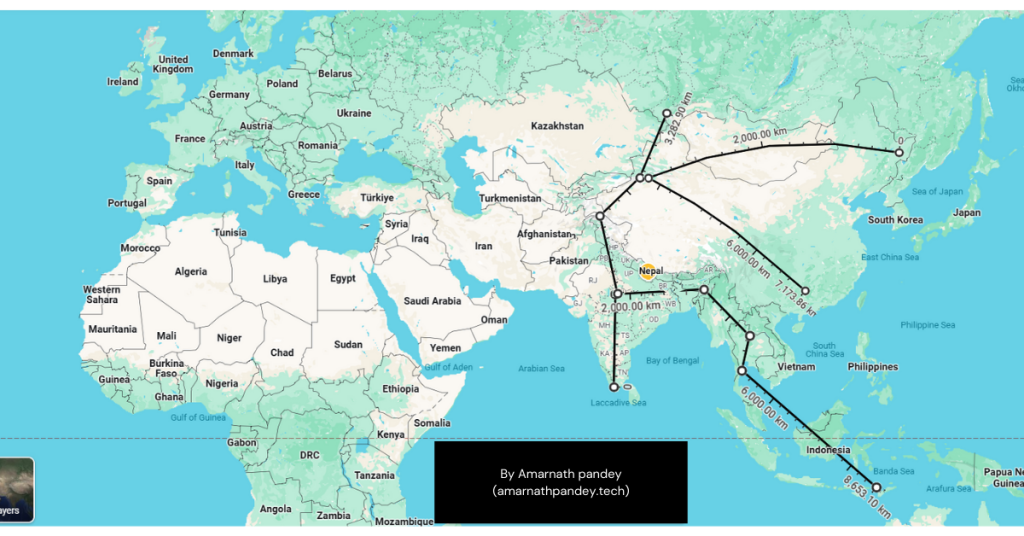
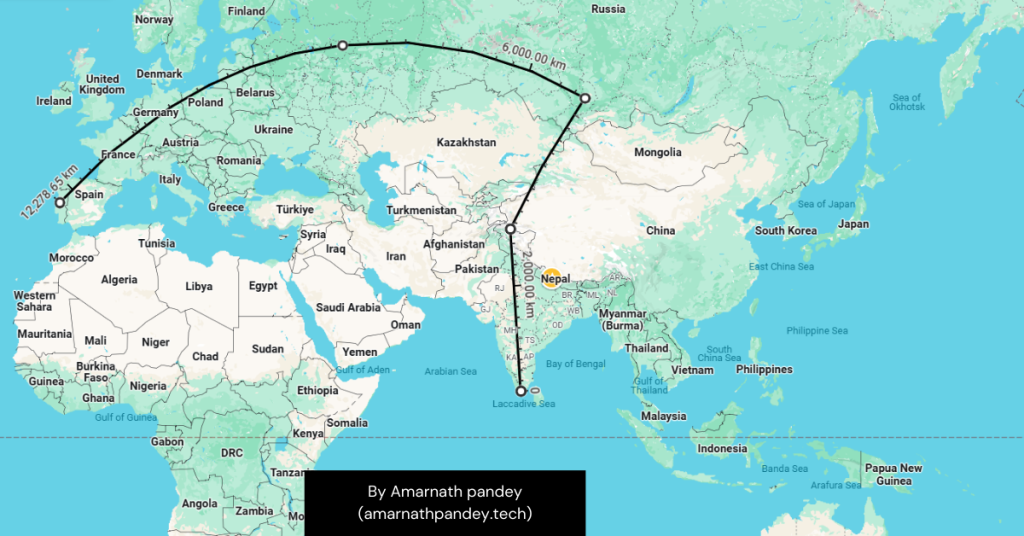
By creating a strong, independent trade bloc, these three nations could:
- Reduce dependence on American-controlled markets.
- Provide Europe with an alternative trade partner, increasing its bargaining power.
- Establish a more multipolar economic system, ensuring that no single nation dictates global trade policies.
Europe’s Role: Creating International Pressure for Fair Competition
Europe, unlike the U.S., is a collection of multiple powerful economies, giving it the ability to influence global trade through collective action. However, its economic dependence on U.S.-controlled supply chains and energy markets has made it vulnerable to American trade policies.
To ensure fair global competition, European nations must use their collective influence to create international pressure on the U.S., compelling it to engage in trade fairly rather than using economic dominance as a coercive tool. By standing together and reinforcing diplomatic and economic pressure, Europe can help shape a multipolar world economy where no single nation dictates global trade.
How the Economic Corridor Benefits Global Trade
1. An Alternative Market for Europe
For decades, Europe has relied heavily on the U.S. for trade, energy, and technology. While the transatlantic partnership remains strong, it has also made European economies vulnerable to American foreign policy decisions—especially when it comes to sanctions, tariffs, and economic restrictions.
A structured India-China-Russia trade alliance would provide European countries with an independent supply chain, allowing them to:
- Diversify their energy imports, particularly from Russia, without relying on American-dominated oil markets.
- Access Chinese manufacturing capabilities at competitive prices, reducing dependence on U.S. and Western companies.
- Strengthen technological cooperation with India, which is emerging as a major force in software, artificial intelligence, and semiconductor industries.
By reducing economic dependence on the United States, Europe would gain greater negotiating power in global trade agreements, allowing it to pursue policies that align with its own interests rather than those dictated by U.S. economic strategy.
2. Breaking the Monopoly on Supply Chains
Currently, the U.S. controls many key trade routes and financial systems, often using them as leverage in geopolitical disputes. The ICREC could counter this by developing independent supply chains, enabling nations to trade without fear of economic retaliation.
This corridor would focus on:
- Energy independence – Russia supplies oil, gas, and raw materials to India and China, creating a self-sustaining system that bypasses U.S.-dominated energy markets.
- Industrial expansion – China’s vast manufacturing infrastructure produces goods that can be exported through new trade routes, reducing reliance on Western supply chains.
- Technology exchange – India contributes its expertise in software, artificial intelligence, and digital services, strengthening innovation outside U.S. tech dominance.
By restructuring global trade routes, this economic corridor could challenge U.S. economic control while fostering stronger international partnerships.
3. Creating Healthy Competition for the American Market
The ICREC is not designed to replace the U.S. market but to create an alternative that introduces real competition. The American economy thrives on the ability to dictate terms to smaller nations, but a strong economic corridor between India, China, and Russia could force the U.S. to become more competitive and cooperative rather than relying on economic coercion.
Healthy competition benefits the world in several ways:
- It prevents monopolies in energy, technology, and trade, ensuring fair pricing and market diversity.
- It encourages greater innovation, as businesses within different economic blocs strive to improve their products and services.
- It forces nations to negotiate rather than dictate terms, leading to a more balanced and fair global trade system.
If properly structured, the India-China-Russia Economic Corridor could become one of the most influential trade networks in modern history, offering Europe and other nations an alternative that prevents excessive dependence on a single superpower.
Conclusion: The Need for Collaboration to Prevent Economic Conflict
For too long, Asian economies—particularly China—have been isolated and treated as adversaries rather than essential partners in the global economy. This pattern of economic division has created tensions that threaten to escalate into a new kind of Cold War—one fought not with weapons, but through trade wars, sanctions, and supply chain disruptions.
If the world is to achieve lasting economic peace, the focus must shift from confrontation to collaboration. A true free market, where trade is driven by mutual benefit rather than economic coercion, is the only way to prevent monopolistic control, global instability, and economic warfare. Instead of pushing nations into opposing economic blocs, world leaders must work towards a balanced global trade system that fosters competition without hostility.
Establishing economic world peace is not just about avoiding war—it’s about ensuring that no nation, no matter how powerful, can dictate the fate of others unilaterally. A multipolar economy, where Asia, Europe, and emerging markets have equal influence, is the only way to prevent economic exploitation, financial dependencies, and unnecessary geopolitical tensions.
The past century has shown that wars—whether military or economic—only lead to long-term destruction. If we truly want to build a stable global economy, collaboration must replace conflict, and fair competition must replace dominance. Only then can we create a world where trade unites nations rather than divides them.

Leave a Reply